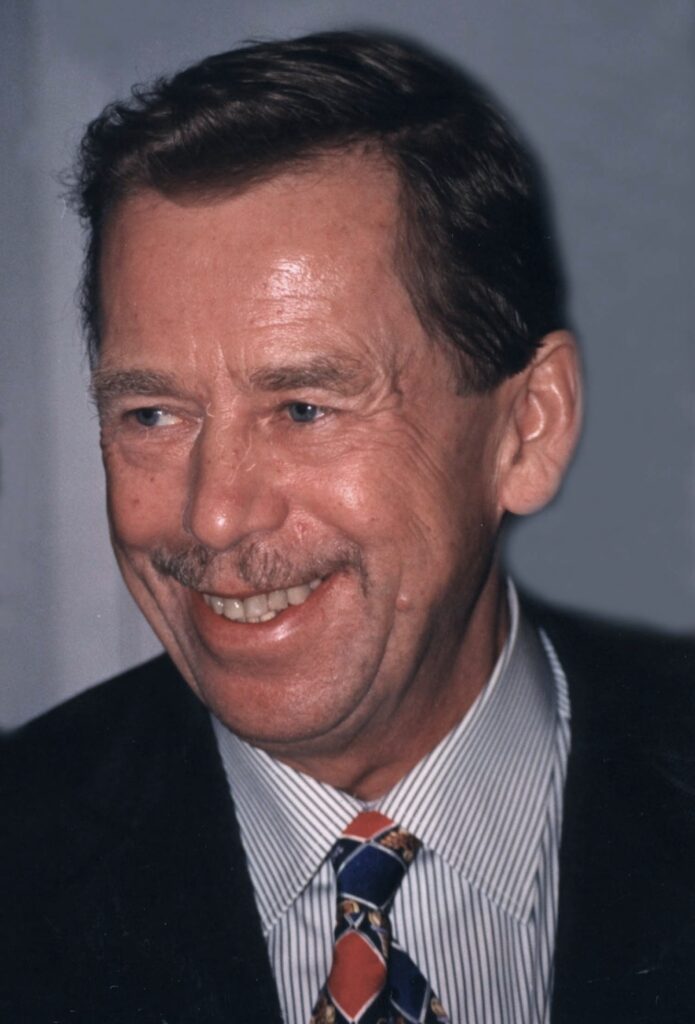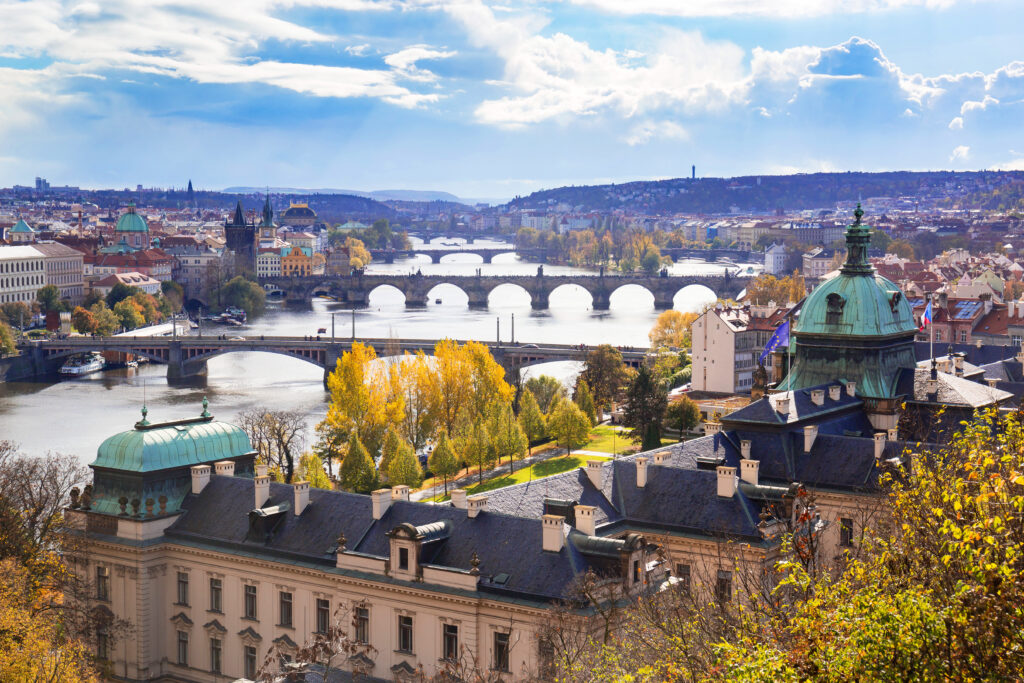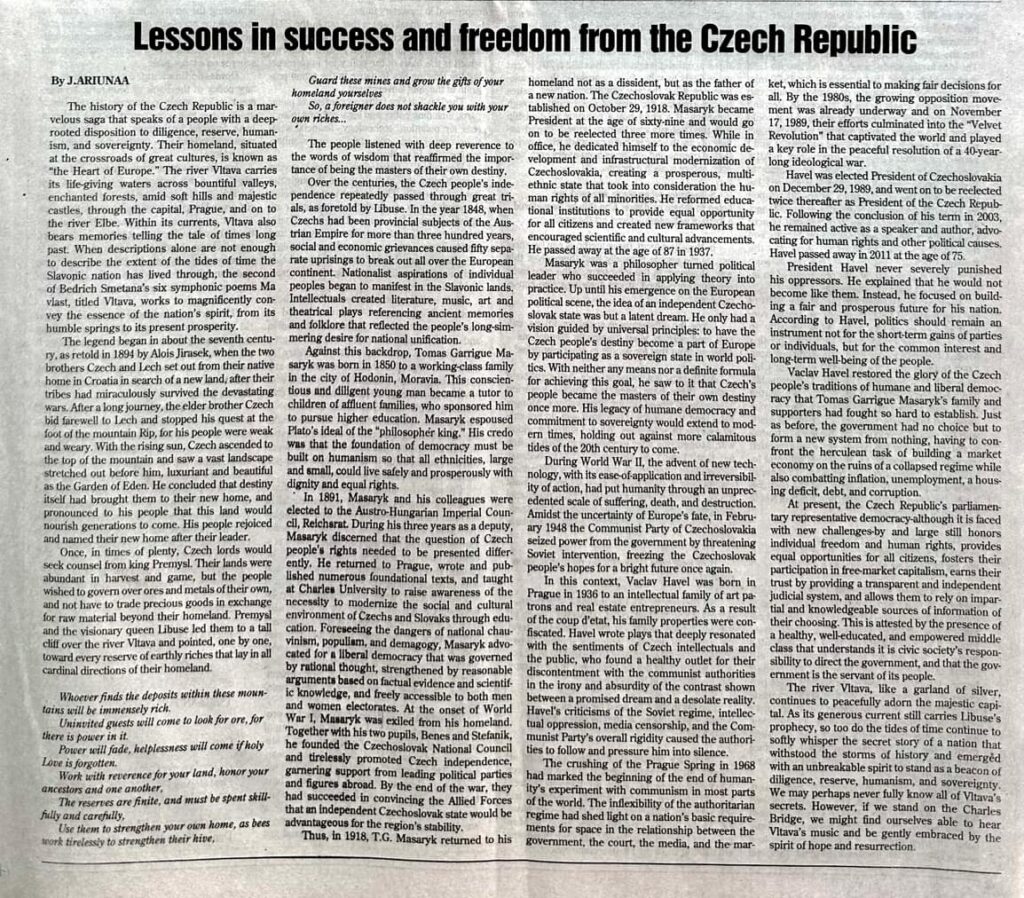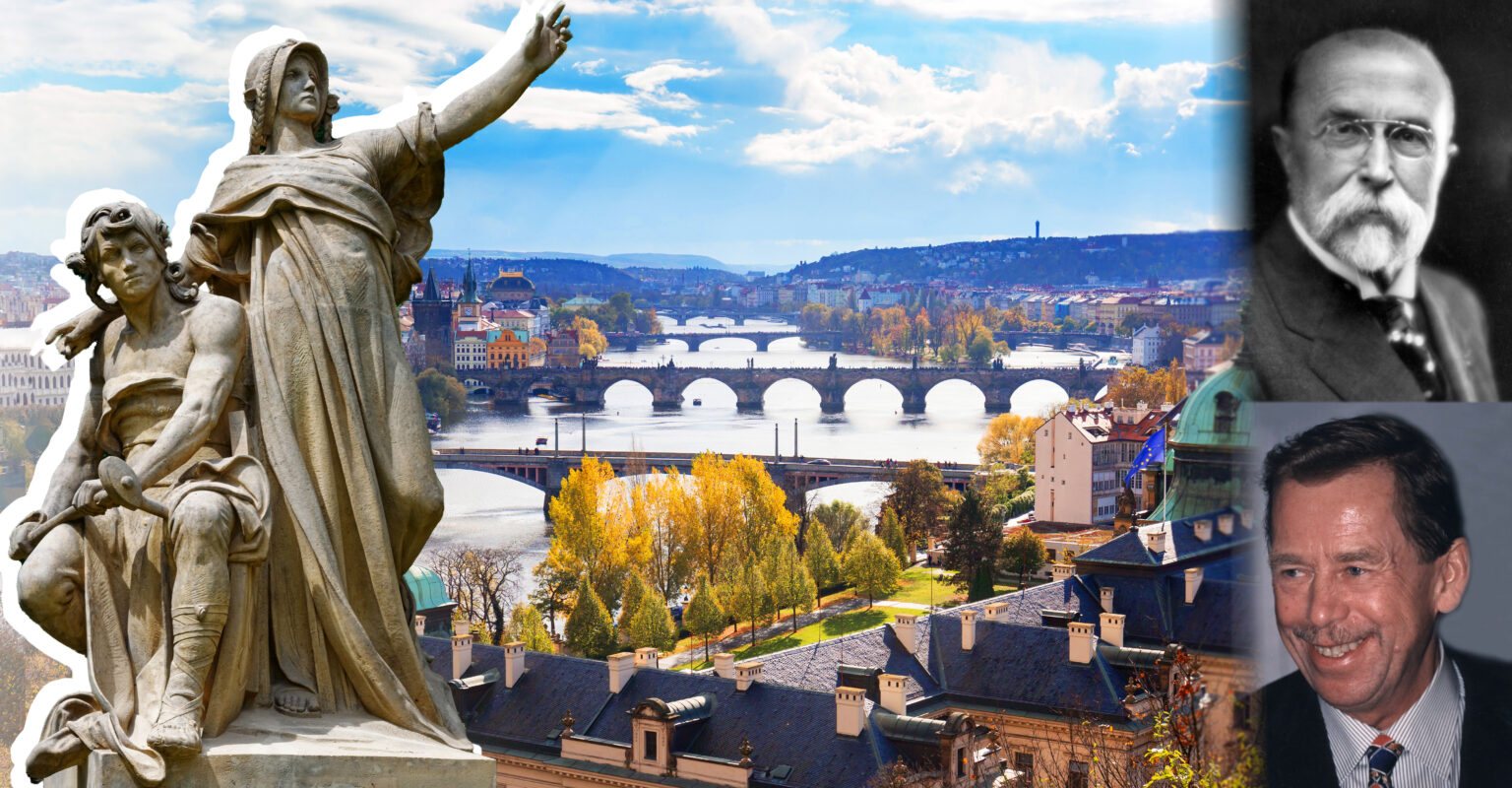Marvelous is the story of a people with a deep-rooted disposition to diligence, reserve, humanism, and sovereignty. Their homeland, situated at the crossroads of great cultures, is known as “the Heart of Europe.” The river Vltava carries its life-giving waters across bountiful valleys, enchanted forests, amid soft hills and majestic castles, through the capital Prague, and on to the river Elbe. Within its currents, Vltava also bears memories telling the tale of times long past—of ages of joy and sorrow, eras of revival and decline, and epochs of stability and upheaval. When descriptions alone are not enough to describe the extent of the tides of time the Slavonic nation has lived through, the second of Bedřich Smetana’s six symphonic poems Má vlast, titled Vltava, works to magnificently convey the essence of the nation’s spirit, from its humble springs to its present prosperity.
Czech
The legend began in about the 7th century, as retold in 1894 by Alois Jirásek, when the two brothers Czech and Lech set out from their native home in Croatia in search of a new land, after their tribes had miraculously survived the devastating wars. After a long journey, the elder brother Czech bid farewell to Lech and stopped his quest at the foot of the mountain Říp, for his people were weak and weary. With the rising sun, Czech ascended to the top of the mountain and saw a vast landscape stretched out before him, luxuriant and beautiful as the Garden of Eden. He concluded that destiny itself had brought them to their new home, and pronounced to his people that this land would nourish generations to come. His people rejoiced and named their new home after their leader.
Czech’s people cultivated the land with diligence. They held blacksmithing in high regard, because iron armed them with the power to shield themselves from aggressors in times of war, as well as gave them the ability to sow and reap precious harvests in times of peace. When their beloved chief passed away in his eighty-sixth year, the people grieved for him deeply and sought counsel from Lech. The brother consoled them and proposed an elder by the name of Krok to be their new leader.

Libuše
The wise king Krok had three daughters: Kazi, Teta, and Libuše. Libuše, the youngest, was most capable of succeeding to the throne; however, she also recognized that the men of Czech were reluctant to follow her. So, gifted with the power of prophecy, the gentle princess foretold that a hard-working ploughman named Přemysl would be the founder of a great dynasty of Czechs. Libuše then directed her men to Přemysl’s country and summoned him to be the leader of her people.
Years later, she also foresaw an illustrious city blessed by the heavens and the stars that captivated the world with its marvelous sight. In her vision, she saw a blacksmith building the doorstep of his new house on the crest of a rocky hill. “As princes and warriors bow their heads before the threshold of a home, so the whole world will bow to this city,” divined Libuše—and in honor of this fortunate prophecy, the city would go on to be named Praha.
Once, in times of plenty, Czech lords would seek counsel from Přemysl. Their lands were abundant in harvest and game, but the people wished to govern over ores and metals of their own, and not have to trade precious goods in exchange for raw material beyond their homeland. Přemysl and Libuše pondered for half a moon. Upon the lords’ return, the visionary queen led them to a tall cliff over the river Vltava and pointed, one by one, toward every reserve of earthly riches that lay in all cardinal directions of their homeland.
Whoever finds the deposits within these mountains will be immensely rich.
Uninvited guests will come to look for ore, for there is power in it.
Power will fade, helplessness will come if holy Love is forgotten.
Work with reverence for your land, honor your ancestors and one another,
The reserves are finite, and must be spent skillfully and carefully,
Use them to strengthen your own home, as bees work tirelessly to strengthen their hive,
Guard these mines and grow the gifts of your homeland yourselves
So a foreigner does not shackle you with your own riches…
The people listened with deep reverence to the words of wisdom that reaffirmed the importance of being the masters of their own destiny.

Masaryk
Over the centuries, the Czech people’s independence repeatedly passed through great trials, as foretold by Libuše. In the year 1848, when Czechs had been provincial subjects of the Austrian Empire for more than three hundred years, social and economic grievances caused fifty separate uprisings to break out all over the European continent. The French Revolution and industrial transformation had brought seismic shifts to systems of governance and distribution of wealth. European monarchs and aristocracy, who were accustomed to exploiting the peasant majority, could no longer easily do so in the face of growing bourgeois classes. As the latter demanded fair representation in the government, adoption of constitutions and universal men’s suffrage became the new norm. There came an era when experiments with liberalism, republicanism, and socialism contested the authoritarian status quo.
On this same great wave of change, nationalist aspirations of individual peoples began to manifest. In the Slavonic lands, intellectuals created literature, music, art and theatrical plays referencing ancient memories and folklore that reflected the people’s long-simmering desire for national unification and independence from oppressive rule. Against this backdrop, Tomáš Garrigue Masaryk was born in 1850 to a working-class family in the city of Hodonín, Moravia. This conscientious and diligent young man became a tutor to children of affluent families, who sponsored him to pursue higher education at the University of Vienna—and later, at Leipzig. Masaryk espoused Plato’s ideal of the “philosopher king.” His credo was that the foundation of democracy must be built on humanism so that all ethnicities, large and small, could live safely and prosperously with dignity and equal rights.
Masaryk worked as a professor of philosophy at Charles University and published articles and books on the subject of Czech and Slovak reformation and revival. In 1886, the discovery of two heroic epics—seemingly the first in Czech literature—caused a public sensation. Masaryk contested the authenticity of these manuscripts, however, by presenting evidence that the poems had been reworked from modern to old Czech language. Even though the public denounced him as a national traitor, he remained steadfast in his principles, stating that the “glory of a nation cannot be built on counterfeits.”
In 1891, Masaryk and his colleagues were elected to the Austro-Hungarian Imperial Council, Reichsrat. They represented the Mladočeská Strana, a liberal political party that favored active participation in advancing the Czechoslovak nationalist agenda—particularly, among others, the welfare of the peasant population. During his three years as a deputy, Masaryk discerned that the question of Czech people’s rights needed to be presented differently. He returned to Prague, wrote and published numerous foundational texts, and then taught at Charles University again.
Masaryk’s moral resolve would be tested once more in 1899 when he defended Leopold Hilsner, who was wrongly convicted of ritual murder due to antisemitic insinuations. The victory cost Masaryk his public reputation, as spectators accused him of being bribed by Jews. The case profoundly affected his family and compelled him to raise awareness of the necessity to modernize the social and cultural environment of Czechs and Slovaks through education.
Foreseeing the dangers of national chauvinism, populism, and demagogy, Masaryk advocated for a liberal democracy that was governed by rational thought, strengthened by reasonable arguments based on factual evidence and scientific knowledge, and freely accessible to both men and women electorates. So, in 1900, together with his colleagues, he created the Realist Party. For seven years, they toiled to have the Czechoslovak people’s rights recognized at the Reichsrat, which only resulted in acute hardship for his family and supporters.
At the onset of World War I, Masaryk was exiled from his homeland. Together with his two pupils, Beneš and Štefánik, he founded the Czechoslovak National Council and tirelessly promoted Czech independence, garnering support from leading political parties and figures in Italy, Switzerland, France, the UK, the USA, Russia, and Japan. By the end of the war, they had succeeded in convincing the Allied Forces that an independent Czechoslovak state would be advantageous for the region’s stability.
Thus, in 1918, Tomáš Garrigue Masaryk returned to his homeland not as a dissident, but as the father of a new nation. The Czechoslovak Republic was established on October 29, 1918. Masaryk became President at the age of sixty-nine, and would go on to be reelected three more times (in 1920, 1927, and 1934). While in office, he dedicated himself to the economic development and infrastructural modernization of Czechoslovakia, creating a prosperous, multi-ethnic state that took into consideration the human rights of all minorities. He reformed educational institutions to provide equal opportunity for all citizens and created new frameworks that encouraged scientific and cultural advancements. He passed away at the age of eighty-seven in 1937.
Masaryk was a philosopher turned political leader who succeeded in applying theory into practice. Up until his emergence on the European political scene, the idea of an independent Czechoslovak state was but a latent dream. He only had a vision guided by universal principles: to have the Czech people’s destiny become a part of Europe by participating as a sovereign state in world politics. With neither any means nor a definite formula for achieving this goal, he saw to it that Czech’s people became the masters of their own destiny once more.
In his words: “We began with empty hands, without an army, without constitutional traditions, and with a rapidly failing currency in the midst of economic chaos. And yet we have stood the test and acquitted ourselves with honor.” Masaryk was resolute in his belief and loyal to his cause—to justice and truth—even to the detriment of his personal interests. His legacy of humane democracy and commitment to sovereignty would extend to modern times, holding out against more calamitous tides of the 20th century to come.

Havel
During World War II, the advent of new technology, with its ease-of-application and irreversibility of action, had put humanity through an unprecedented scale of suffering, death, and destruction. The USSR, having suffered the main part of the war, liberated the Eastern European nations, but also established communist rule in the region. The ideological conflict between the Soviet Union and the United States of America ignited a Cold War, and the former allies became enemies.
Amidst the uncertainty of Europe’s fate, Czechoslovakia—based on the legacy of a liberal democracy—had devised its own approach to recovery and was beginning to prosper. In February 1948, however, the Communist Party of Czechoslovakia seized power from the government by threatening Soviet intervention, freezing the Czechoslovak people’s hopes for a bright future once again.
In this context, Václav Havel was born in Prague in 1936 to an intellectual family of art patrons and real estate entrepreneurs. As a result of the coup d’etat, his family properties were confiscated, and he and his brother were ostracized from educational institutions. Although he wished to learn music, Havel instead studied economics for two years before dropping out of Czech Technical University in Prague. He then began submitting articles and essays to various literary publications.
Havel’s plays and written works deeply resonated with the sentiments of Czech intellectuals and the public, who found a healthy outlet for their discontentment with the communist authorities in the irony and absurdity of the contrast shown between a promised dream and a desolate reality. Havel soon became a well-respected playwright and political critic among intellectual circles. His criticisms of the Soviet regime, intellectual oppression, media censorship, and the Communist Party’s overall rigidity caused the authorities to follow and pressure him into silence.
Reformers within the Communist Party appealed for the possibility to loosen the tight grip on economic production, democratize the policies, and allow room for freer expression and broader participation of the citizens in the country’s developments, while at the same time remaining respectful of the Warsaw Treaty. This appeal culminated in a public movement called the “Prague Spring” in 1968. Protestors, frustrated with the government’s reassurance of the Soviets, called for political sovereignty. The cautious efforts for steady progress toward reform were crushed altogether on August 21, 1968, when Soviet tanks invaded downtown Prague.
Afterwards, censorship and oppression became even stricter, and forms of expression were banned. Writers, journalists, and leading thinkers were expelled from government agencies. In 1976, the prohibition of an underground rock concert and arrest of the band members, The Plastic People of the Universe, on grounds of subversion of society called people to action. Havel and his friends authored the human rights manifesto titled Charter 77. 243 individuals signed the petition, which addressed the government’s violation of the 1975 Helsinki Accords on citizens’ rights to political, economic, civil, and cultural freedom.
The crushing of the Prague Spring had marked the beginning of the end of humanity’s experiment with communism in most parts of the world. The inflexibility of the authoritarian regime had shed light on a nation’s basic requirements for space in the relationship between the government, the court, the media, and the market, which is essential to making fair decisions for all.
In 1978, Havel wrote a political essay titled The Power of the Powerless, in which he expressed that political change avoided by the communist system now depended on the courage of civic society and its refusal to comply with the oppressive norms that force people to retreat each night into their own little worlds after a day of soul-crushing work, while pretending to be part of a totally united society. The only way to overcome servitude, he wrote, was for individual citizens to assume moral leadership by daring to live in truth.
In 1979, Václav Havel was sentenced to four years in prison for subversion of society. By the 1980s, the growing opposition movement (led by him) was already underway, as economic stagnation in the communist system reached a level of crisis. In Czechoslovakia, the government’s attempts to demoralize freedom fighters were failing. An overwhelming number of political dissidents were mobilizing to take destiny into their hands once again. In November 1989, their efforts culminated into a movement called the “Velvet Revolution” that captivated the world. The Communist Party was compelled to surrender power. Thus, the Revolution played a key role in the peaceful resolution of a forty-year-long ideological war.
Václav Havel was elected President of Czechoslovakia on December 29, 1989, and went on to be reelected twice thereafter (in 1993 and 1998) as President of the Czech Republic. Following the conclusion of his term in 2003, he remained active as a speaker and author, advocating for human rights and other political causes. The Czech Republic joined the European Union on May 1, 2004, and Havel passed away in 2011 at the age of seventy-five.
President Havel never severely punished his oppressors. He explained that he would not become like them. Instead, he focused on building a fair and prosperous future for his nation. According to Havel, politics should remain an instrument not for the short-term gains of parties or individuals, but for the common interest and long-term well-being of the people. In a moving speech on New Year’s Day of 1990, he discussed the meaning of true sovereignty, saying that though our nation has suffered, we must not remain a victim of injustice, looking for help from powers outside of ourselves:
Our state should never again be an appendage or a poor relative of anyone else. It is true that we must accept and learn many things from others, but we must do this in the future as their equal partners, who also have something to offer. […] Our country, if that is what we want, can now permanently radiate love, understanding, the power of the spirit and of ideas. I dare to say that we may even have an opportunity to spread this idea further and introduce a new element into European and global politics.
Václav Havel restored the glory of the Czech people’s traditions of humane and liberal democracy that Tomáš Garrigue Masaryk’s family and supporters had fought so hard to establish when the nation was founded at the beginning of the turbulent 20th century. Just as before, the newly formed republic had no choice but to form a democratic government from nothing, having to confront the herculean task of building a market economy on the ruins of a collapsed system while also combatting inflation, unemployment, a housing deficit, debt, and corruption.
At present, the Czech Republic’s parliamentary representative democracy—although it is faced with new challenges—by and large still honors individual freedom and human rights, provides equal opportunities for all citizens, fosters their participation in free-market capitalism, earns their trust by providing a transparent and independent judicial system, and allows them to rely on impartial and knowledgeable sources of information of their choosing. This is attested by the presence of a healthy, well-educated, and empowered middle class that understands it is civic society’s responsibility to direct the government, and that the government is the servant of its people.
The change brought about by Václav Havel had matched its time and place. Neither Havel nor Masaryk promised illusions for their own short-term election goals. Throughout the ages, the Czech people had fought long and hard to preserve their sovereignty, needing to become masters of their own destiny time and time again, learning to take responsibility for every decision and the subsequent results. They are not the victim of a foreign authority’s decisions. No one forced the Czech people to become a sovereign nation, a capable and prosperous partner on the international arena. They are the sole owners of their success. The powerful and educated electorate, raised by traditions of independence, humanity, and honest work made sure of it.
Today, the Czech Republic offers the world so much more than “something,” as Havel once humbly expressed. Its pristine and mystical capital Prague alone welcomes well over seven million visitors each year from all corners of the world. The attentive and conscientious care for the preservation of its historical heritage and the sensible organization and integration of innovative additions to the city’s unique image and infrastructure all attest to the humane legacy of the nation’s leading minds and souls, who sacrificed greatly for the common good of the people.
The river Vltava, like a garland of silver, continues to peacefully flow and adorn the majestic capital. As its generous current still carries Libuše’s prophecy, so too do the tides of time continue to softly whisper the secret story of a nation that withstood the storms of history and emerged with an unbreakable spirit to stand as a beacon of diligence, reserve, humanism, and sovereignty. We may perhaps never fully know all of Vltava’s secrets; after all, Czechia has so much to offer. However, if we stand on the Charles Bridge and allow the mystic river to captivate us with its charm in the twilight, we might find ourselves able to hear Vltava’s music and be gently embraced by the spirit of hope and resurrection.

By J. Ariunaa
Published in UB Post
August 14, 2024

Images
- Dmitry A. Mottl. Vltava river in Prague. October 27, 2017. Photograph. Wikimedia Commons. https://commons.wikimedia.org/wiki/File:Vltava_river_in_Prague.jpg.
- Kingkongphoto & www.celebrity-photos.com from Laurel Maryland, USA. Vaclav Havel © copyright John Mathew Smith 2001, Washington D.C. National press club May 13, 1997. October 24, 2010. Photograph. Wikimedia Commons. https://commons.wikimedia.org/wiki/File:Vaclav_Havel.jpg.
- Cheng, Holly. Tomáš Garrigue Masaryk, bust portrait, facing left by Lomen Brothers 1920. March 22, 2015. Photograph. Wikimedia Commons. https://commons.wikimedia.org/wiki/File:Tom%C3%A1%C5%A1_Garrigue_Masaryk_cph.3a46477.jpg.
- Přemysl a Libuše, Vyšehrad, Prague, Czech Republic. Sculpture designed by Josef Václav Myslbek in 1881. July 22, 2019. Photograph. Wikimedia Commons. https://commons.wikimedia.org/wiki/File:P%C5%99emysl_et_la_princesse_Libu%C5%A1e_par_Josef_Myslbeck_-_Parc_Vy%C5%A1ehrad_Prague.jpg.
Sources
- Аникина, Татьяна. “КУЛЬТУРА ПЕРВОЙ РЕСПУБЛИКИ.” Accessed June 28, 2024. https://ruslo.cz/index.php/lektsii/item/1068-kultura-pervoj-respubliki.
- “Austria-Hungary | History, Definition, Map, & Facts | Britannica,” June 18, 2024. https://www.britannica.com/biography/Tomas-Masaryk.
- Tomáš Masaryk: The Father of Czechoslovakia, 2020. https://www.youtube.com/watch?v=JJkK-A0Hkos.
- “Czechoslovakia | History, Map, & Facts | Britannica,” May 17, 2024. https://www.britannica.com/place/Czechoslovakia.
- “Czechoslovakian President Address | C-SPAN.Org.” Accessed July 5, 2024. https://www.c-span.org/video/?10917-1/czechoslovakian-president-address.
- “Happy Birthday to Smetana’s ‘The Moldau’!,” April 3, 2022. https://interlude.hk/on-this-day-4-april-bedrich-smetana-vltava-the-moldau-was-premiered/.
- Enkhzhargal, Dagwasümberelijn. Bügd najramdakh Chjekh uls: tüükh, sojol, uls tör, edijn zasag Mongol uls – Bügd najramdakh Chjekh ulsyn kharilcaa. Ulaanbaatar: MUIS-ijn khewlekh üjldwer, 2021.
- Ethics and Culture. “Vaclav Havel and the Power of the Powerless,” March 9, 2021. http://www.ethicsandculture.com/blog/2021/vaclav-havel-and-the-power-of-the-powerless.
- Google Arts & Culture. “President Tomáš Garrigue Masaryk.” Accessed June 29, 2024. https://artsandculture.google.com/story/president-tomáš-garrigue-masaryk/JgVhxLb7bBcA8A.
- Tomáš Garrigue Masaryk, 2014. https://www.youtube.com/watch?v=LYWXRexth9g.
- Křištanová, Dita. 100 Významných Českých Osobností. Říčany: Nakladatelství SUN, 2019.
- Noble, Thomas F. X. et al. Western Civilization: The Continuing Experiment. 3rd ed. Boston: Houghton Mifflin, 2002.
- Rinchen, B. “Эртний Чех Домог, Тууж” Бямбын Ренчин Vol. 4. Ulaanbaatar: Nepko Publishing, 2018.
- “Tomáš Masaryk | Founding Father of Czechoslovakia | Britannica.” Accessed June 28, 2024. https://www.britannica.com/biography/Tomas-Masaryk.
- “Либушины Пророчества На Сказка.Ру.” Accessed June 28, 2024. https://www.skazka.ru/story/irasek/libushiny-prorochestva/?ysclid=lxtxn3n299167055297.
- «Философ На Троне. Томаш Масарик», 2017. https://www.youtube.com/watch?v=eIOR7Um69zw.







